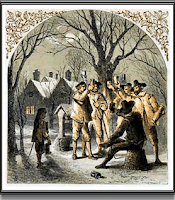 Wassailing used to be a popular part of the Christmas festivities in England and the memory of it still lingers in the words of certain carols, but what was wassailing, and how exactly did people go about it?
Wassailing used to be a popular part of the Christmas festivities in England and the memory of it still lingers in the words of certain carols, but what was wassailing, and how exactly did people go about it?Wassail itself was a hot drink which pre-dates the Christian festival by some centuries. The word ‘wassail’ comes from the Old English wæs hæl which literally meant ‘be whole’ and so, by extension, ‘be healthy’. The phrase ‘hale and hearty’ has its origins in this expression as well.
The ceremony from which wassailing developed was a toast to the sun as it rose on the morning after the shortest day of the winter solstice. It, like the veneration of evergreens, was believed to encourage a bountiful harvest (specifically that of fruit) in the year to come.
The transformation of the winter festival to a Christian one did nothing to diminish the popularity of the wassail toast and it persisted, like so much else, becoming interwoven with the newer Christianised celebrations.
In Saxon England, at the start of the year, the lord of the manor would shout the greeting wæs hæl to his assembled household who would respond with the words drinc hæl, meaning ‘drink and be healthy’. His lordship would then take a swig from a large wooden bowl – the Wassail Bowl or Wassail Cup – before passing it on to the next most senior member of the household. And so it would be passed down the line until everyone had had a drink.
'TWAS - The Krampus Night Before Christmas is available to buy now, and if you've already read it, please do post a review on Amazon, Goodreads, and anywhere else you can think of.
To find out more about the festive season and its many traditions, order your copy of the Chrismologist's Christmas Explained: Robins, Kings and Brussel Sprouts today!
The book is also available in the United States as Christmas Miscellany: Everything You Ever Wanted to Know About Christmas.


























